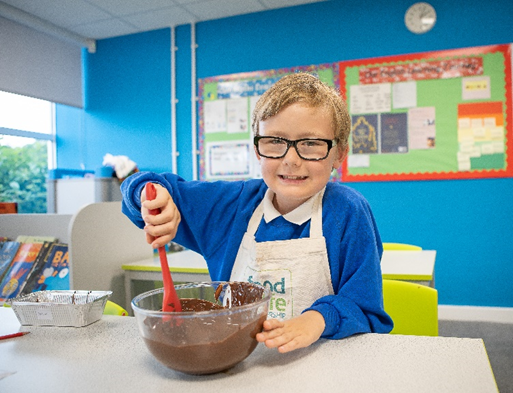Design Technology
At Whipton Barton Federation, our Design and Technology curriculum aims to ignite curiosity and creativity in our pupils, inspiring them to become innovative and resourceful thinkers. Through a structured and progressive approach, we aim to foster an understanding of the product design cycle, allowing pupils to explore the stages of ideation, creation, and evaluation. We want children to feel confident taking risks, experimenting with ideas, and evaluating both their own and others' work.
The curriculum is designed to develop not only the technical and practical expertise required for everyday tasks but also the critical thinking and problem-solving skills needed to thrive in an increasingly technological world. As pupils progress, they will gain an appreciation for the impact of design and technology on their daily lives and understand the importance of sustainability, functionality, and aesthetics in the world around them.
Our vision is to empower pupils to become forward-thinking, enterprising citizens who are equipped with the skills necessary to contribute to future design advancements. This will be achieved by building a strong foundation in six key areas, which are revisited throughout the curriculum with increasing complexity:
Cooking and Nutrition, Mechanisms/Mechanical Systems, Structures, Textiles, Electrical Systems (KS2 only), and the Digital World (KS2 only).
The Design and Technology curriculum follows the National Curriculum’s Programme of Study and is structured around four key strands that run through all year groups:
Design
- Research existing products and identify the needs of users.
- Develop design criteria, considering both functional and aesthetic requirements.
- Generate ideas through sketches, prototypes, and models (physical and digital).
- Innovate and create fit-for-purpose solutions to design problems.
- Use tools such as cross-sectional diagrams, exploded diagrams, and templates to communicate ideas.
Make
- Select and use appropriate tools, materials, and equipment for different tasks.
- Understand the properties of materials and components, including those used in cooking and nutrition.
- Carry out practical tasks with precision, focusing on health and safety.
- Work with a variety of materials and processes, including shaping, decorating, and assembling products.
Evaluate
- Investigate and analyse existing products.
- Test, evaluate, and critique designs against established criteria.
- Reflect on personal work and the work of others to make improvements.
- Study the impact of key individuals, events, and inventions in design history.
Technical Knowledge
- Understand the principles behind mechanisms, structures, electrical systems, and digital technology.
- Apply knowledge of materials, tools, and components to real-world design challenges.
- Learn the basics of food preparation and cooking, including the principles of healthy eating and the origins of food.
Each strand is developed progressively, with children responding to design briefs that require them to consider the needs of others and work through the design process. This approach helps build and apply a broad repertoire of skills, knowledge, and understanding.
The design process is central to our curriculum, with pupils engaging in the stages of Design, Make, and Evaluate, underpinned by technical knowledge. This enables them to create high-quality prototypes and products, continually refining their skills and reflecting on their learning. The curriculum is structured as a spiral, revisiting key concepts and challenges to allow pupils to build on prior knowledge and enhance their understanding.

Early Years:
Children in our Reception classes begin to develop their understanding of Design and Technology from the very beginning. Through the safe use of scissors, paintbrushes, playdough modelling tools, and construction materials, children learn ‘the best tools for the job’. Throughout the year, children have access to a well-resourced creative area where they design and make their own models; it is here they discover the joys of PVA glue compared to a glue stick or masking tape compared to sticky tape.
In the Spring term of Reception, children are introduced to a project where they design, make, and evaluate their own chairs for Baby Bear. They select the tools they need to join their components together, developing problem-solving skills and an understanding of how different materials and joining methods work in a practical context. This experience forms the foundation for more complex design and technology projects as they progress through the school. In the Summer term of Reception, Reception children are introduced to their 'Healthy, Happy Me' topic which includes looking at eating a healthy, balanced diet. This topic introduces the children to the different food groups needed for a healthy diet and forms the foundation of nutritional knowledge which is built on as they progress through the school.
Key Areas of Focus:
- Cooking and Nutrition
Pupils will explore the principles of healthy eating, understand the nutritional value of different foods, and develop cooking skills that allow them to prepare balanced meals. They will study the relationship between diet and health, learning where food comes from and the importance of seasonality. - Mechanisms/Mechanical Systems
Pupils will design and make models with moving parts, understanding the mechanics behind levers, pulleys, gears, and cams. - Structures
Pupils will investigate and design structures that can support loads, learning about materials, shapes, and stability. - Textiles
Pupils will design, make, and evaluate textile-based products, developing skills in sewing, weaving, and other fabric manipulation techniques. - Electrical Systems (KS2 only)
In Key Stage 2, pupils will explore the principles behind electrical circuits, learning how to use basic components like bulbs, buzzers, and motors to create functioning products. - Digital World (KS2 only)
Pupils will be introduced to basic principles of programming, designing and creating interactive digital products that meet specific user needs.
Oracy in Design and Technology
We believe in the power of oracy to deepen learning and foster communication skills. Pupils will develop their speaking and listening skills by:
- Presenting their design ideas to different audiences.
- Explaining their preferences and the reasoning behind their design choices.
- Collaborating in groups, organising tasks, and sharing ideas.
- Critiquing their own and others’ designs, offering constructive feedback.
- Reflecting on feedback to improve and adapt their products.
- Using new vocabulary to discuss their work and evaluate products.
By the end of their primary education, pupils at Whipton Barton Federation will:
- Have a comprehensive understanding of the functional and aesthetic properties of materials.
- Be able to use a range of tools and techniques to create high-quality products.
- Be equipped with the skills and confidence to evaluate their work and the work of others.
- Appreciate the importance of sustainability and the social and environmental impact of design decisions.
- Be knowledgeable about healthy eating and nutrition, and possess cooking skills to make informed choices about their diet.
- Demonstrate a clear understanding of key historical figures, events, and inventions in the world of design and technology.
- Be confident, reflective learners who can apply their skills to new challenges and real-world problems.
Our Design and Technology curriculum prepares children to actively participate in the technological world of the future, equipping them with the practical and creative skills needed to excel in a variety of fields. Through hands-on learning, critical thinking, and reflective practice, children will be ready to shape the world around them with ingenuity and confidence.

